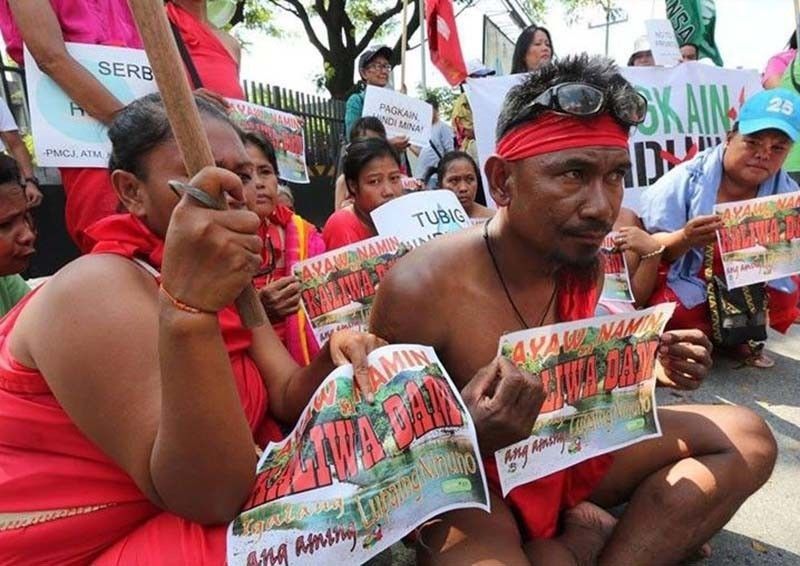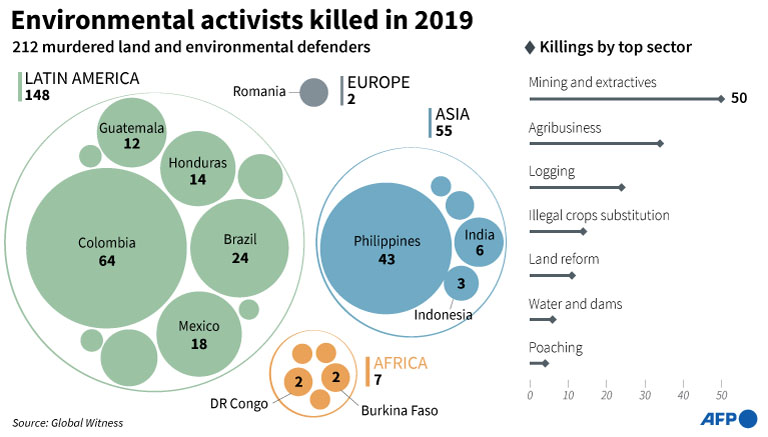Philippines 'deadliest' country for land, environmental defenders in Asia

MANILA, Philippines — The Philippines was the deadliest country in Asia for environmental and land activists in 2019, with at least 43 recorded deaths, according to an international watchdog.
In a report released Wednesday, Global Witness said that 20% of the 212 of the environmental activists defenders murdered last year were from the Philippines, making it the second most dangerous nation in the world behind Colombia and the first in Asia.

Farmers, indigenous leaders and government workers tasked with protecting the environment were among the victims.
In 2018, the Philippines had the highest number of recorded deaths—at 30—worldwide.
Global Witness said that more than half of the deaths in the country last year were related to agribusiness. Meanwhile, 16 killings were linked to mining—the highest globally.
“We are suffering a global pandemic expected to inflict P2.2-trillion damages on top of at least 1.36-trillion losses from climate impacts and natural resource plunder incurred over the past four years of the Duterte administration,” Leon Dulce, national coordinator of Kalikasan People’s Network for the Environment, said in a statement.
“It is alarming that Filipino environmental defenders confronting these existential planetary crises are still increasingly criminalized and murdered under the administration of President Rodrigo Duterte,” he added.
Highly militarized regions
Nearly 90% of the killings last year took place in resource-rich Mindanao and on Negros Island, according to the report.
Almost half of all land and environment defenders killed last year were from Mindanao, where the military has long maintained a heavy presence.
The report put a spotlight on Talaingod-Manobo communities in Mindanao, which is being threatened by mining projects and China-backed hydropower dam—an example of “business at all costs” in the country.
“Large companies, influential politicians and established landowners continue to make money with brazen disregard for the rights and wellbeing of local communities, and the lives of activists,” Global Witness said.
A large number of activists were also killed on Negros island in Visayas, which is also heavily militarized.
“Peasant laborers and farmers groups have long campaigned for land reform over the island’s vast sugar plantations to address inequality and poverty across the region. Despite promises, the Philippine government has done little to support these communities, frequently putting the interests of big agribusiness first,” it said.
According to the Global Witness, half of the documented killings since Duterte assumed power in 2016 were linked to the armed forces or paramilitary groups.
Criminalization of activists
The report stressed that the “relentless vilification of defenders by the government and widespread impunity for their attackers” may be driving the increase in killings.
“In the Philippines, individual activists and environmental organizations have been accused of being rebels or communist sympathizers—a practice commonly known as ‘red-tagging.’ Inflammatory calls by Duterte’s government to kill activists deemed to be obstructing justice,’ as well as his direct threats to bomb indigenous schools puts defenders at much greater risk of attacks,” it said.
Early this month, Duterte signed the controversial terror bill into law which environmentalists feared could result in more attacks against activists protecting the climate and the country’s forest and seas.
Even government workers were not spared. Eight of the reported murders of state employees responsible for protecting the environment took place in the Philippines.
Organizations Kalikasan PNE, Save our School Network and Alyansa Tigil Mina urged the Philippine government to conduct an independent investigation into attacks on indigenous groups, remove military units from lands of indigenous peoples and dismantle paramilitary groups.
They also called for the repeal of the Anti-Terrorism Act of 2020.
- Latest
- Trending



































